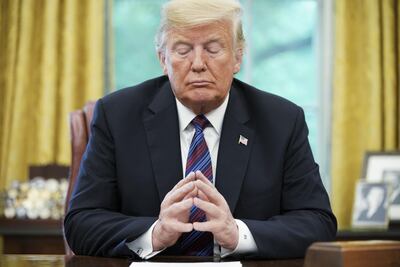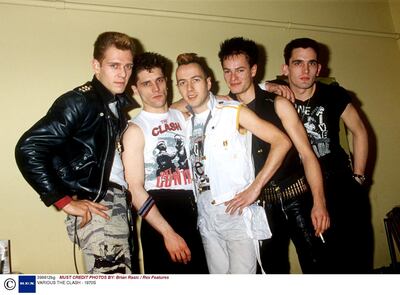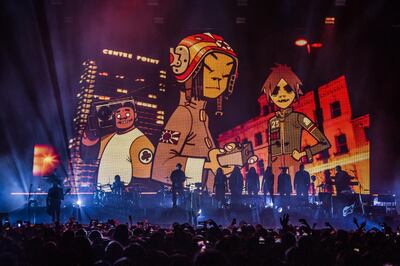Pop music and politics have long enjoyed a dysfunctional relationship, marked by wary trysts and embarrassed silences. For every timeless, biting political anthem – What's Going On by Marvin Gaye or Public Enemy's Fight the Power – there have been a dozen unfortunately misinformed, garbled political diatribes by celebrities who seem to have more ego than insight.
Which might be why, while musicians were once held up as the voice of their generation, recent times have seen increasingly media-savvy stars sidestepping ever-further away from having an opinion on anything.
Until, that is, now. It was purportedly Ancient Greeks who first decreed that desperate times call for desperate measures, which can be the only explanation for the laundry list of musicians who have stood up to take a stand – or a swipe – at the world as they see it.
Target Trump
Naturally, the crosshairs of liberally minded musicians' outrage often coalesce on a single target: one sitting in The White House. Most recently, Katy Perry, John Legend, Rod Stewart, Neil Young and Axl Rose were among the A-listers who slammed United States President Donald Trump's "heartless" response to last month's California wildfires, which claimed at least 88 lives. The president said, in a tweet, that the only reason for their occurrence was poor forest management.
A few days earlier, Pharrell Williams became the latest name to take a stand against Trump, using his music – joining the ever-swelling ranks of Adele, Rihanna, Aerosmith, REM, The Rolling Stones and Queen – filing a cease-and-desist letter after the US president played upbeat anthem Happy hours after a mass shooting in Pittsburgh.
But such headlines barely register as newsworthy any more. Even pop queen Madonna felt comfortable telling an audience of thousands that she "thought an awful lot about blowing up the White House", a day after Trump's inauguration in January last year at the Women's March in Washington.
The barometer has shifted so far, and so fast, that it’s become obligatory for celebrities to speak out about the latest presidential calamity – after months of criticism, Taylor Swift was finally forced to make a Democratic endorsement before the recent midterm elections (Trump’s immature response was to say he likes Swift’s music “25 per cent less”).
This underlines a sea change within the showbiz landscape: when Trump’s most unlikely supporter, Kanye West, blasted George W Bush as a racist in 2005, there was a huge backlash from those who suggested pop musicians had no place to “insult the office”. Today, such disses are almost demanded. However, it’s one thing to speak – or tweet – out, but quite another to put your convictions in song. And from Childish Gambino to Janelle Monae, 2018’s toxic, divided climate has proved the zeitgeist for an unlikely resurgence in the delicate art of fusing pop and politics.
A brief history of protest songs
In western pop music, no injustice has historically inspired such a solidified musical front as the Civil Rights struggle – best-remembered anthems include Nina Simone's Mississippi Goddam, Sam Cooke's A Change is Gonna Come (both 1964) and The Impressions' People Get Ready (1965).
Amid increasing police brutality and division, in 1971, Marvin Gaye asked What's Going On and Gil-Scott Heron told us The Revolution Will Not Be Televised, while three years later, Stevie Wonder took aim at Richard Nixon with You Haven't Done Nothin'. Politics were again centre stage during the punk tumult of the late 1970s – The Clash addressed both the Spanish Civil War (Spanish Bombs) and Iranian Revolution (Rock the Casbah) – while another flagpole moment of unity was found in the anti-Apartheid movement, epitomised in The Special AKA's Free Nelson Mandela (1984). Yet recent decades have seen politics increasingly displaced from mainstream music. Even in the aftermath of the 2008 global debt crisis, and the resulting Occupy movement, protest songs were generally far from the media eye.
In 2011, music critic Dorian Lynskey published 33 Revolutions Per Minute: A History of Protest Songs, as a "eulogy" for the form.
Protest, millennial style
Newsflash: it's not just Trump. Even before a divisive reality TV outlier was elected leader of the "free world", a newly assertive, creative energy was galvanised amid the Black Lives Matter movement. Identity and politics were wrestled with on game-changer Kendrick Lamar's To Pimp a Butterfly (2015) and Solange's A Seat at the Table, before the latter's sister, Beyonce, unleashed racially conscious masterpiece Lemonade (both 2016). All three records topped the Billboard charts.
Yet when YG and Nipsey Hussle released the hastily recorded, niche and not-so-subtle FDT in March 2016, months before Trump's nomination was secured, few might have predicted the vitriolic wave to come. Run the Jewels slammed a warmongerer with a "bad toupee and a spray tan" on Talk to Me in October 2016, the same month that indie stalwarts Death Cab for Cutie riffed on Trump's heritage with Million Dollar Loan, the first release in the anti-Trump 30 Days, 30 Songs project. Three days before the election, surprise A Tribe Called Quest reunion/swansong We Got It From Here… Thank You 4 Your Service addressed the climate of uncertainty – "Trump and SNL hilarity," rapped recently departed Phife Dawg from beyond the grave on Conrad Tokyo (which featured Lamar). The night before inauguration, Gorillaz broke a six-year hiatus with the charged Hallelujah Money.
Things polarised further as the executive orders came spinning from the Oval Office. Released eight months before August 2017's Charlottesville race riots, NYC rapper Joey Bada$$ envisioned the ugliness ahead on Land of the Free, declaring "Three Ks, Two As in AmeriKKKa". Soon after, Lamar again crystallised the moment with Pulitzer Prize-winning Damn, and called out Trump as a "chump" on The Heart Part 4, amid more cerebral critiques of contemporary America.
If the protest movement needed a banner name to chime with ageing white newspaper editors, it came in October last year when Eminem – the bestselling artist of the noughties – unleashed a surprise freestyle at the BET Hip Hop Awards, declaring: "Any fan of mine who's a supporter of his, I'm drawing in the sand a line." According to recent release The Ringer, Eminem faced questions from the Secret Service after the stunt, which he blames for a shrinking fan base.
_________________________
Read more:
Top of the pops: has the battle for Christmas No 1 lost its festive cheer?
Whamageddon: Will the latest song-led craze last until next Christmas?
The rise of the deluxe box set
__________________________
Talking 2018
But it's 2018 that has unleashed the most potent Trump-era musical statements, epitomised by two socially conscious, major pop releases that perform the rare feat of charging minds and calling clicks.
Closing April's acclaimed concept album Dirty Computer, Janelle Monae's Americans is a slick, sleek, up-tempo electro-pop singalong of unbridled substance: "I like my woman in the kitchen, I teach my children superstitions, I keep my two guns on my blue nightstand," she sings. A bitter middle monologue extols everything divisive and evil about Trump's America, declaring that "until women can get equal pay for equal work" and "until Latinos and Latinas don't have to run from walls" that "this is not my America".
It serves as an unwitting companion to Childish Gambino's This Is America – released a week later – a searing state-of-the-nation address framed by gloomy beats and communal campfire singalongs. Propelled to the top of the charts astride a startling, single-take-styled viral video – which depicts the rapper, topless, machine-gunning a church choir, adrift among looters and burning cars, before intoning the refrain "this is America" – it's a brazenly raw and startlingly inventive pastiche that will top many "Song of the Year" lists in coming weeks.




